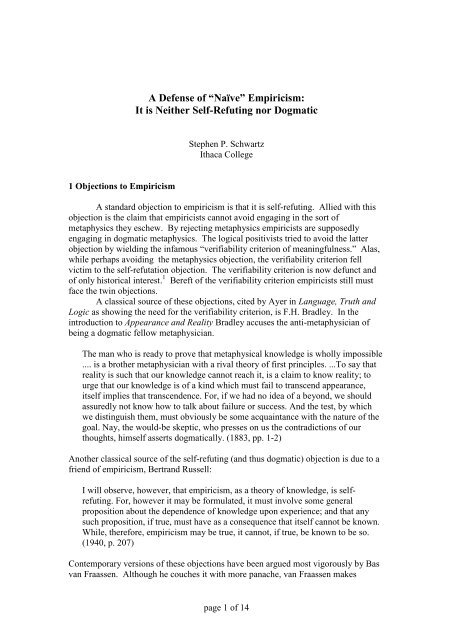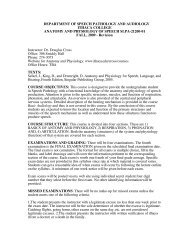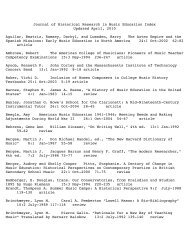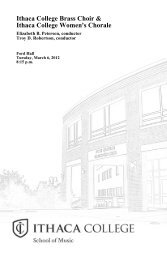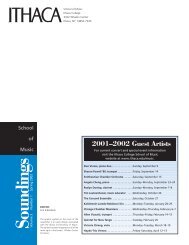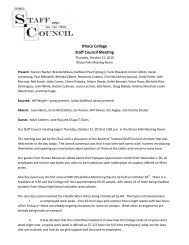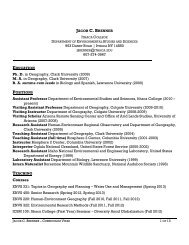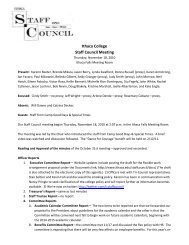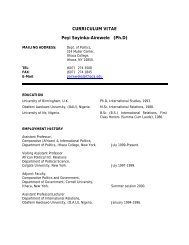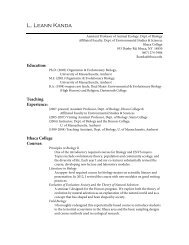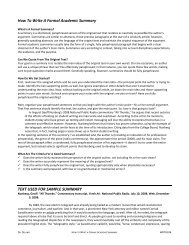A Brief Defense of Empiricism - Ithaca College
A Brief Defense of Empiricism - Ithaca College
A Brief Defense of Empiricism - Ithaca College
You also want an ePaper? Increase the reach of your titles
YUMPU automatically turns print PDFs into web optimized ePapers that Google loves.
A <strong>Defense</strong> <strong>of</strong> “Naïve” <strong>Empiricism</strong>:<br />
It is Neither Self-Refuting nor Dogmatic<br />
Stephen P. Schwartz<br />
<strong>Ithaca</strong> <strong>College</strong><br />
1 Objections to <strong>Empiricism</strong><br />
A standard objection to empiricism is that it is self-refuting. Allied with this<br />
objection is the claim that empiricists cannot avoid engaging in the sort <strong>of</strong><br />
metaphysics they eschew. By rejecting metaphysics empiricists are supposedly<br />
engaging in dogmatic metaphysics. The logical positivists tried to avoid the latter<br />
objection by wielding the infamous “verifiability criterion <strong>of</strong> meaningfulness.” Alas,<br />
while perhaps avoiding the metaphysics objection, the verifiability criterion fell<br />
victim to the self-refutation objection. The verifiability criterion is now defunct and<br />
<strong>of</strong> only historical interest. 1 Bereft <strong>of</strong> the verifiability criterion empiricists still must<br />
face the twin objections.<br />
A classical source <strong>of</strong> these objections, cited by Ayer in Language, Truth and<br />
Logic as showing the need for the verifiability criterion, is F.H. Bradley. In the<br />
introduction to Appearance and Reality Bradley accuses the anti-metaphysician <strong>of</strong><br />
being a dogmatic fellow metaphysician.<br />
The man who is ready to prove that metaphysical knowledge is wholly impossible<br />
.... is a brother metaphysician with a rival theory <strong>of</strong> first principles. ...To say that<br />
reality is such that our knowledge cannot reach it, is a claim to know reality; to<br />
urge that our knowledge is <strong>of</strong> a kind which must fail to transcend appearance,<br />
itself implies that transcendence. For, if we had no idea <strong>of</strong> a beyond, we should<br />
assuredly not know how to talk about failure or success. And the test, by which<br />
we distinguish them, must obviously be some acquaintance with the nature <strong>of</strong> the<br />
goal. Nay, the would-be skeptic, who presses on us the contradictions <strong>of</strong> our<br />
thoughts, himself asserts dogmatically. (1883, pp. 1-2)<br />
Another classical source <strong>of</strong> the self-refuting (and thus dogmatic) objection is due to a<br />
friend <strong>of</strong> empiricism, Bertrand Russell:<br />
I will observe, however, that empiricism, as a theory <strong>of</strong> knowledge, is selfrefuting.<br />
For, however it may be formulated, it must involve some general<br />
proposition about the dependence <strong>of</strong> knowledge upon experience; and that any<br />
such proposition, if true, must have as a consequence that itself cannot be known.<br />
While, therefore, empiricism may be true, it cannot, if true, be known to be so.<br />
(1940, p. 207)<br />
Contemporary versions <strong>of</strong> these objections have been argued most vigorously by Bas<br />
van Fraassen. Although he couches it with more panache, van Fraassen makes<br />
page 1 <strong>of</strong> 14
A <strong>Defense</strong> <strong>of</strong> “Naïve” <strong>Empiricism</strong> page 2 <strong>of</strong> 14<br />
basically the same points as Bradley and Russell. Van Fraassen accuses the<br />
tendentiously titled “naive empiricist” with being dogmatic. Here is the heart <strong>of</strong> van<br />
Fraassen‟s argument:<br />
There must then be some statement E+ such that<br />
(NE) To be an empiricist = to believe that E+ (the empiricist dogma).<br />
The mnemonic name "(NE)" stands for "Naive <strong>Empiricism</strong>." (2002, p.42)<br />
A candidate for E+ could be something like "Experience is the one and only<br />
source <strong>of</strong> information." (2002, p. 43)<br />
Unfortunately, since E+ is the dogma that sums up the entire basis <strong>of</strong> this<br />
empiricism, it is also the sole basis for any empiricist critique <strong>of</strong> metaphysics. It<br />
follows now that by the empiricist's own lights, any empiricist critique can<br />
therefore be legitimately countered as follows: "The target <strong>of</strong> your critique is a<br />
claim contrary to E+, hence equally admissible as a hypothesis and not to be ruled<br />
out from the outset." There is now either no longer any bite to the critique, or else<br />
it bites its own tail. (2002, p. 46)<br />
I understand van Fraassen‟s charge that “naive” empiricism either has no bite or bites<br />
its own tail to be that either empiricism cannot effectively attack metaphysics or is<br />
itself engaged in metaphysics. Van Fraassen explains his rather dubious metaphor in<br />
the following passages:<br />
Suppose empiricists rest their critique on any factual thesis about what we are like<br />
or what the world is like. What should they do, then, if a metaphysician disagrees<br />
with that thesis? Empiricists say, "Disagreement among us is always possible and<br />
always allowed; let us both explore the factual hypotheses we favor." But if this is<br />
their response to the metaphysician, they are then and thereby giving up on the<br />
idea <strong>of</strong> a radical critique <strong>of</strong> metaphysics. (2002, pp. 43-44)<br />
If the empiricists' position consists,..., in the assertion or belief <strong>of</strong> a factual thesis,<br />
then they have no way to demur from the very sort <strong>of</strong> metaphysics they typically<br />
attack. This is modern empiricism's second, and I think much more serious,<br />
disaster. (2002, p. 46)<br />
2 The Fundamental Principle <strong>of</strong> <strong>Empiricism</strong><br />
Carl Hempel in his definitive article on the empiricist criterion <strong>of</strong><br />
meaningfulness (the verifiability criterion) formulates the basic principle <strong>of</strong><br />
empiricism. “The fundamental principle <strong>of</strong> modern empiricism is the view that all<br />
non-analytic knowledge is based on experience.” (1950, p. 41) Here we have van<br />
Fraassen‟s empiricist E+ principle—the one he claims cannot work. Hempel<br />
correctly points out that this principle does not entail the verifiability criterion, so the<br />
defeat <strong>of</strong> the verifiability criterion does not automatically mean that we must give up<br />
the fundamental principle <strong>of</strong> empiricism; but if the accusations <strong>of</strong> Bradley, Russell,<br />
and van Fraassen are correct and the fundamental principle <strong>of</strong> empiricism is in fact an<br />
objectionable dogmatic metaphysical principle or if it is self-refuting, then empiricism
A <strong>Defense</strong> <strong>of</strong> “Naïve” <strong>Empiricism</strong> page 3 <strong>of</strong> 14<br />
is untenable. If so, then perhaps the only road is to treat empiricism as a proposal or<br />
stance as van Fraassen urges (2002). 2<br />
Fortunately the empiricist has a cogent reply to these objections although not<br />
one that empiricists have hitherto resorted to, except obliquely. 3 I propose to defend<br />
the claim that the fundamental principle <strong>of</strong> empiricism is an empirical hypothesis, and<br />
can be advanced in a way that avoids the objections that empiricism is self-refuting or<br />
engaged in dogmatic metaphysics. Van Fraassen‟s objections notwithstanding,<br />
consistent with empirical principles, empiricism is an empirical theory that does not<br />
“lose its bite or bite its own tail.” Once we see that the objections <strong>of</strong> dogmatism and<br />
self-refutation have no bite, we can ask the question whether the fundamental<br />
principle <strong>of</strong> empiricism has strong empirical support and is worthy <strong>of</strong> our allegiance.<br />
I will answer that it does and is.<br />
First, Hempel‟s statement <strong>of</strong> the fundamental principle <strong>of</strong> empiricism needs<br />
some clarification. 4 Hempel‟s statement suggests but does not entail that analytic<br />
knowledge is not based on experience. Modern empiricists following Russell,<br />
Whitehead, and Wittgenstein <strong>of</strong> the Tractatus held that mathematics, logic, and<br />
geometry are analytic or tautological and that analytic propositions do not represent<br />
full-bodied knowledge; they do not represent any matters <strong>of</strong> fact beyond the meanings<br />
<strong>of</strong> terms or conventions about their meanings. The logical positivists claimed that<br />
mathematics, although fascinating and surprising, is not substantial and knowledge <strong>of</strong><br />
mathematical truths is not knowledge <strong>of</strong> substantial matters, not knowledge <strong>of</strong> matters<br />
<strong>of</strong> fact. The idea is that analytic propositions are purely formal or non-substantive<br />
and thus are no threat to empiricism. The positivists‟ claims about mathematics being<br />
analytic may not be correct; there may be no analytic propositions; or the distinction<br />
between analytic and synthetic propositions may be bogus. While each <strong>of</strong> these<br />
claims has been the subject <strong>of</strong> intense debate, all <strong>of</strong> this is irrelevant to the purpose at<br />
hand. The point is that we are interested in non-analytic knowledge. 5 This is what<br />
modern empiricists and their modern opponents are contending about. Clearly<br />
Hempel was intending by the phrase “non-analytic knowledge” to exclude knowledge<br />
<strong>of</strong> basic logic, mathematics, geometry, and seemingly purely trivial, conventional, or<br />
formal props like “January has 31 days,” “All grandmothers have had children,” and<br />
so on from the sweep <strong>of</strong> the fundamental principle <strong>of</strong> empiricism. Also he would<br />
probably exclude claims such as “Nothing can be both red and green all over at the<br />
same time” which can plausibly be given a somewhat formal treatment (Putnam 1956,<br />
1957). Empiricists can give the rationalists a priori (i.e. non-experiential) knowledge<br />
<strong>of</strong> these sorts <strong>of</strong> propositions as long as a priori knowledge does not extend beyond<br />
these; in particular as long as a priori knowledge does not extend to substantive<br />
propositions such as that an omniscient, omnipotent God exists or each human being<br />
has an immortal soul. For rationalism to <strong>of</strong>fer a defeating challenge to empiricism<br />
some substantive non-analytic propositions would have to be knowable a priori. This<br />
is what empiricists deny. Empiricists, at least those that follow Hempel, hold that all<br />
substantive knowledge is based on experience. I do not think that Hempel would be<br />
troubled if all the opponents <strong>of</strong> empiricism could come up with as knowable a priori<br />
are logic, mathematics, and propositions such as the formal ones cited above, even if<br />
the explanation <strong>of</strong> the a prioricity <strong>of</strong> these is not precisely that <strong>of</strong>fered by the logical<br />
positivists. 6<br />
“Based on experience” is itself an unclear and metaphorical phrase and<br />
empiricists have disagreed about how to understand it. Clearly Hempel means by<br />
“experience” “sensory experience, memory, and experience <strong>of</strong> our own conscious<br />
mental states” but beyond that not much is clear. Despite disagreements among
A <strong>Defense</strong> <strong>of</strong> “Naïve” <strong>Empiricism</strong> page 4 <strong>of</strong> 14<br />
modern empiricists about these issues, there is agreement that certain supposed<br />
sources <strong>of</strong> knowledge are illusory. In particular, according to modern empiricists<br />
there is no possibility <strong>of</strong> substantive knowledge based on pure intellectual intuition,<br />
pure reason, recollection <strong>of</strong> platonic forms, mystical insight, or anything that is<br />
claimed to be entirely independent <strong>of</strong> the senses, memory <strong>of</strong> past sensory experiences,<br />
and introspection into our own mental contents.<br />
If no possible sensory experience, observation, experiment, survey, or<br />
outcome <strong>of</strong> any empirical scientific procedure could provide evidence against a claim,<br />
then that claim is not based on experience. 7 We do not need for our purposes to<br />
arrive at a more precise definition <strong>of</strong> “based on experience.” Let us call sensory<br />
experiences, observations, experiments, surveys, and outcomes <strong>of</strong> any scientific<br />
procedure “empirical sources <strong>of</strong> knowledge.” If no possible sensory experience,<br />
observation, experiment, survey, or outcome <strong>of</strong> any scientific procedure, could<br />
provide evidence against a claim then it is not based on empirical sources <strong>of</strong><br />
knowledge—it is not based on experience. The fundamental principle <strong>of</strong> empiricism<br />
is the claim that there are no non-empirical sources <strong>of</strong> non-analytic knowledge. Or<br />
equivalently: “All sources <strong>of</strong> non-analytic knowledge are empirical.”<br />
From the fundamental principle <strong>of</strong> empiricism we get something like the<br />
verifiability criterion only it is an epistemological criterion <strong>of</strong> knowledge or rather<br />
criterion <strong>of</strong> knowability and it is entailed by the fundamental principle. As an<br />
epistemological criterion it is not subject to defeat by the standard objections to the<br />
semantic verifiability criterion <strong>of</strong> meaningfulness. The empiricist criterion <strong>of</strong><br />
knowledge can be formulated as follows: “No non-analytic proposition that is<br />
independent <strong>of</strong> empirical sources <strong>of</strong> knowledge can be known to be true or known to<br />
be false.” In order to be faithful to the empiricists‟ fundamental principle we should<br />
understand the empiricist criterion <strong>of</strong> knowledge as leaving no room for rational belief<br />
or rational disbelief in any non-analytic proposition that is not based on empirical<br />
sources <strong>of</strong> knowledge. The fundamental claim <strong>of</strong> modern empiricism—that there are<br />
no non-empirical sources <strong>of</strong> knowledge—should be understood to mean that there is<br />
no possibility <strong>of</strong> any non-empirical evidence for or against any non-analytic<br />
proposition. So the empiricist criterion <strong>of</strong> knowledge should be understood to assert<br />
that there is no possibility <strong>of</strong> even the tiniest shred <strong>of</strong> evidence or support for or<br />
evidence against any proposition that is not empirical evidence or support. Any nonanalytic<br />
proposition that is completely immune to support or undermining by<br />
empirical evidence is immune to any and all support or undermining.<br />
3 Empirical <strong>Empiricism</strong><br />
Although Hempel nowhere asserts this, in order to avoid the fatal objections <strong>of</strong><br />
self-refutation and dogmatism we must insist that the fundamental principle <strong>of</strong><br />
empiricism is an empirical hypothesis and thus that the empiricist criterion <strong>of</strong><br />
knowability is empirical as well. I also claim, somewhat more hesitantly, that these<br />
empirical claims are well supported by empirical evidence, and thus that empiricism<br />
not only avoids the objections that it is self-refuting and engaged in metaphysics, but<br />
also that empiricism is correct. <strong>Empiricism</strong> is a true empirical theory.<br />
The empirical support for the fundamental principle <strong>of</strong> empiricism is diffuse<br />
but salient. Our common empirical experience and experimental psychology <strong>of</strong>fer<br />
evidence that humans do not have any capacity to garner knowledge 8 except by<br />
empirical sources. The fact is that we believe that there is no source <strong>of</strong> knowledge,
A <strong>Defense</strong> <strong>of</strong> “Naïve” <strong>Empiricism</strong> page 5 <strong>of</strong> 14<br />
information, or evidence apart from observation, empirical scientific investigations,<br />
and our sensory experience <strong>of</strong> the world, and we believe this on the basis <strong>of</strong> our<br />
empirical a posteriori experiences and our general empirical view <strong>of</strong> how things<br />
work. For example, we believe on empirical evidence that humans are continuous<br />
with the rest <strong>of</strong> nature and that we rely like other animals on our senses to tell us how<br />
things are. If humans are more successful than other animals, it is not because we<br />
possess special non-experiential ways <strong>of</strong> knowing, but because we are better at<br />
cooperating, collating, and inferring. In particular we do not have any capacity for<br />
substantive a priori knowledge. There is no known mechanism by which such<br />
knowledge would be made possible. This is an empirical claim.<br />
Granted, most <strong>of</strong> the evidence for the fundamental principle <strong>of</strong> empiricism is<br />
negative. Among this negative evidence is the fact that rationalists have never <strong>of</strong>fered<br />
any acceptable explanation for how human beings might get substantive a priori<br />
knowledge (or non-substantive a priori knowledge for that matter). Even such a<br />
friend <strong>of</strong> the a priori as Christopher Peacocke admits that there is no explanation for<br />
our supposed a priori knowledge <strong>of</strong> the propositions he <strong>of</strong>fers as examples:<br />
It is <strong>of</strong>ten clear that a proposition is a priori, while the nature <strong>of</strong> the<br />
justification or entitlement for belief in the proposition remains unclear. When this<br />
combination obtains, it is a task for a philosophical theorist <strong>of</strong> the a priori to<br />
explain what the justification or entitlement is.... The identification <strong>of</strong> the full<br />
nature <strong>of</strong> the entitlement that sustains a priori knowledge, as opposed to its<br />
existence, is an open question in almost all the domains mentioned above. (2005,<br />
p. 746)<br />
In the absence <strong>of</strong> such an explanation the a priori status <strong>of</strong> the claims is questionable<br />
at best. 9 “The domains mentioned above” consist <strong>of</strong> branches <strong>of</strong> mathematics and<br />
logic plus moral principles, principles <strong>of</strong> economics, metaphysical assertions, and<br />
claims about the impossibility <strong>of</strong> color sharing, and so on. If the best a friend <strong>of</strong> the<br />
substantive a priori can do is point to supposed examples <strong>of</strong> substantive a priori<br />
claims and admit that he has no explanation <strong>of</strong> how we come to them, then we can<br />
reasonably question his examples. In the same essay and elsewhere Peacocke gives<br />
what he calls a metasemantic account <strong>of</strong> a priority in which a priority is based on the<br />
possession conditions for concepts. Although he calls his position moderate<br />
rationalism, I do not see how this differs from versions <strong>of</strong> empiricism. An empiricist<br />
need not deny that concepts give rise to a priori propositions. Indeed, Peacocke<br />
insists that his view is consistent with Quinean naturalism, so I am inclined to view<br />
the dispute as partially terminological and not threatening to moderate empiricism. 10<br />
As further evidence <strong>of</strong> our lack <strong>of</strong> nonempirical sources <strong>of</strong> knowledge we can<br />
cite the fact that outside <strong>of</strong> the areas <strong>of</strong> mathematics, logic, and geometry, there is no<br />
agreement on any substantive claim that is independent <strong>of</strong> empirical sources <strong>of</strong><br />
knowledge. In the history <strong>of</strong> philosophy we have the spectacle <strong>of</strong> classical<br />
rationalists 11 asserting many propositions on the basis <strong>of</strong> their pure rational or<br />
philosophical insight and using this as support for their claim that humans have the<br />
capacity for pure rational insight while at the same time other rationalists disagree<br />
with them about almost everything they assert on this basis—except for the claim that<br />
what we conceive clearly and distinctly is true in the way we conceive it. The fact<br />
that philosophers and others have never been able to agree at all about a priori<br />
metaphysical claims is empirical evidence that we do not have the capacity for such<br />
knowledge that the rationalists claim we do.
A <strong>Defense</strong> <strong>of</strong> “Naïve” <strong>Empiricism</strong> page 6 <strong>of</strong> 14<br />
BonJour (1998), who styles himself a moderate rationalist, argues that there<br />
must be a priori knowledge because without it no knowledge beyond what is<br />
immediately observable would be possible. Since there is such knowledge, we must<br />
have a priori knowledge. However, as admitted by BonJour, this only establishes that<br />
we have a priori knowledge <strong>of</strong> principles <strong>of</strong> reasoning and inference. As already<br />
conceded, the moderate empiricist can (and probably must) admit that basic logic and<br />
mathematics are a priori. The interesting issue between the rationalist and the<br />
empiricist is whether a priori knowledge extends beyond these formal realms. In<br />
order to establish that we have access to substantive a priori knowledge rationalists<br />
would need to provide answers to three questions: 1. What is the mechanism? 2. Why<br />
is there no wide agreement? 3. What reliable methods <strong>of</strong> reaching agreement are<br />
available where there is disagreement? Lacking satisfying answers to these three<br />
questions leaves rationalism without any visible means <strong>of</strong> support. BonJour‟s favorite<br />
example <strong>of</strong> an a priori claim apprended by pure reason is that no object can be wholly<br />
red and wholly green at the same time. Aside from questions about whether this<br />
claim is in fact substantive, 12 BonJour in order to make his position even remotely<br />
plausible must explain in what sense the claim that no object can be wholly red and<br />
wholly green is substantive, and if so a priori, and what the mechanism is that<br />
explains our putative ability to grasp this fact by “pure rational insight” as BonJour<br />
claims we do. (See in this connection Crane (2003) and Devitt (2005). Quoted in<br />
note #8.)<br />
The existence <strong>of</strong> empirical support for the fundamental principle <strong>of</strong><br />
empiricism has also been questioned. Van Fraassen (1995, pp. 74 and 79), in his<br />
argument against the sort <strong>of</strong> “naive empiricism” I am expounding, claims that an<br />
empirical investigation <strong>of</strong> the fundamental principle <strong>of</strong> empiricism is not worth a<br />
penny <strong>of</strong> grant money. He argues that it is not a genuinely testable empirical claim or<br />
if testable is too restricted to be <strong>of</strong> any use to the empiricist. He imagines trying to<br />
test the hypothesis by putting people in sensory deprivation chambers and so on. I‟m<br />
inclined to agree with van Fraassen that testing the hypothesis is not worth a penny <strong>of</strong><br />
grant money and that testing in cognitive science labs would be useless, 13 but consider<br />
that most <strong>of</strong> our deeply held empirical beliefs are like that. Would you spend grant<br />
money testing whether tigers are quadrapedal? But according to Kripke that is an<br />
empirical claim that conceivably could be empirically falsified. Likewise consider the<br />
claim that there is not a copy <strong>of</strong> the Manhattan phone book at the exact center <strong>of</strong> the<br />
Sun. Certainly we believe this to be true, but is it testable? We have vast numbers <strong>of</strong><br />
deeply held empirical views about things and how the world is and works that are not<br />
directly testable, nor need they be. Nevertheless they are empirical and ultimately<br />
based on sensory observation; they are certainly not a priori or based on pure reason.<br />
The fundamental principle <strong>of</strong> empiricism is another one <strong>of</strong> these, or at least it should<br />
be. Consider another example: Suppose we see a magician perform a trick, such as<br />
David Blaine with his “Street Magic.” He accosts a total stranger on the street. Asks<br />
her to pick a card at random from a deck. She picks the card, notes what it is and puts<br />
it back in the deck, then Blaine asks her to look behind her. There the card (or one<br />
just like it?) is taped to the inside <strong>of</strong> a window <strong>of</strong> a nearby shop. (I have seen videos<br />
<strong>of</strong> this and similar tricks.) We may not have any idea how this is performed, but one<br />
thing we do know, or at least believe, is that it is not done by magic. It is not done by<br />
any force unknown to science. Whatever the explanation is—slight <strong>of</strong> hand,<br />
collusion, or whatever—it is perfectly ordinary. It is not done by occult powers. And<br />
we know this, or at least believe it, not dogmatically, but empirically although again<br />
this would not be worth an investigation. Nor is our belief absolutely immune to
A <strong>Defense</strong> <strong>of</strong> “Naïve” <strong>Empiricism</strong> page 7 <strong>of</strong> 14<br />
revision. It is an ordinary empirical belief—like the belief that we do not have powers<br />
<strong>of</strong> knowledge that exceed the sensory.<br />
Empirical empiricism so construed may be naive, but it can also be moderate<br />
or minimal as well. An empiricist need not be committed to epistemic<br />
foundationalism or views about the translatability <strong>of</strong> all meaningful concepts into<br />
sensory terms, or that all knowledge reduces to my sense data. The supposed<br />
refutations <strong>of</strong> empiricism <strong>of</strong>fered by Bradley, Russell, and van Fraassen are not aimed<br />
at classical individualistic empiricism, but are directed at a more common sense<br />
“naïve” social and intersubjective naturalistic empiricism <strong>of</strong> the sort I am arguing for<br />
here. Certainly a moderate or minimal empiricist can and perhaps should insist on<br />
some version <strong>of</strong> Quinean holism, the Quine-Duhem Thesis, epistemic pragmatism and<br />
so on. Even though the only evidence available to us for any hypothesis is empirical<br />
evidence, empirical evidence need not be the only reason to accept or reject an<br />
hypothesis. Hypotheses that are equally supported could be accepted or rejected on<br />
the basis <strong>of</strong> extra-empirical virtues and I see no reason why extra-empirical virtues<br />
cannot always play a role in hypothesis acceptance or rejection. Nor is a moderate<br />
empiricist restricted to a narrow construal <strong>of</strong> evidence. According to empiricism an<br />
hypothesis that is immune to any empirical evidence is not rationally acceptable or<br />
rejectable, but a moderate empiricist can admit many sorts <strong>of</strong> empirical evidence<br />
including common sense (i.e. our general empirical ideas about how the world<br />
works), inference to the best explanation, and induction. These may give only weak<br />
empirical support but we are not demanding certainty.<br />
4 Response to the Objections<br />
Contrary to Russell, empiricism construed as an empirical theory is not selfrefuting.<br />
The fundamental principle <strong>of</strong> empiricism is an empirical hypothesis for<br />
which as we have seen there is a great deal <strong>of</strong> support. Furthermore many <strong>of</strong> us,<br />
including me, believe this principle on the basis <strong>of</strong> our empirical experience,<br />
observation, and empirical understanding <strong>of</strong> how the world and we work. If we<br />
demand certainty for knowledge, Russell is correct that empiricism “...cannot, if true,<br />
be known to be so,” but knowledge <strong>of</strong> the fundamental principle <strong>of</strong> empiricism is not<br />
necessary to avoid self-refutation. All that is required is that the fundamental<br />
principle <strong>of</strong> empiricism be an empirical hypothesis, and that it is.<br />
Nor is the naïve empiricist forced into engaging in the sort <strong>of</strong> dogmatic<br />
metaphysics he rejects as Bradley and van Fraassen argue. The empiricist is forced<br />
into controversy with the anti-empirical metaphysician but this controversy is strictly<br />
empirical. To deny the fundamental principle <strong>of</strong> empiricism the metaphysician must<br />
claim that it is false: he must claim that there are non-empirical sources <strong>of</strong> knowledge,<br />
but this also is an empirical claim that has been defended on empirical grounds by<br />
anti-empiricists. Kurt Gödel argued that our capacity for mathematics demonstrates<br />
that humans can “perceive” abstract eternal objects as clearly as we perceive physical<br />
objects. More recently Noam Chomsky has argued for a version <strong>of</strong> Cartesian<br />
rationalism based on innate ideas. His evidence for his theory <strong>of</strong> innate ideas is<br />
empirical. That humans do not have any sources <strong>of</strong> non-empirical knowledge is an<br />
empirical hypothesis and the person who would deny it should present evidence as<br />
such against it. Since the fundamental principle <strong>of</strong> empiricism is an empirical claim,<br />
it is subject to empirical refutation. Perhaps we will discover that the classical
A <strong>Defense</strong> <strong>of</strong> “Naïve” <strong>Empiricism</strong> page 8 <strong>of</strong> 14<br />
rationalists, or moderate contemporary rationalists such as Peacocke and BonJour, or<br />
Gödel, and Chomsky are right and that humans properly trained or stimulated do have<br />
the capacity for some sort <strong>of</strong> rational insight, or a capacity for pure thought that can<br />
be marshaled in such a way as to generate substantive a priori knowledge, or that<br />
there are innate ideas or universal innate knowledge. Such a capacity would have to<br />
be empirically established and objectively verified. There would have to be wide<br />
agreement <strong>of</strong> the sort that other verified empirical claims enjoy; most importantly<br />
there would have to be an explanatory mechanism. We cannot now rule out such a<br />
discovery, but at present the fundamental principle <strong>of</strong> empiricism has more in favor <strong>of</strong><br />
it than against it. In any case, and to repeat the response to the central issue: In<br />
defending the fundamental principle <strong>of</strong> empiricism, the empiricist is engaging in<br />
discussion with the metaphysician, but this discussion is and must be empirical in<br />
nature, not metaphysical in any sense dangerous to the empiricist. Thus contrary to<br />
van Fraassen the naive empiricist is not forced into metaphysics in any damaging<br />
sense.<br />
Although empiricism construed as an empirical theory does not fall victim to<br />
the two standard objections, perhaps circularity is now a problem. Supporting<br />
empiricism empirically might seem to involve circular reasoning. Aren‟t I<br />
presupposing empiricism to support empiricism? Not exactly. The argument would<br />
be circular only if it presupposed the fundamental principle <strong>of</strong> empiricism, but it does<br />
not. All that it supposes is that the fundamental principle <strong>of</strong> empiricism can be<br />
supported by and undermined by empirical investigations and evidence. That there<br />
are no non-empirical sources <strong>of</strong> non-analytic knowledge is an empirical claim<br />
comparable to the claim that the Sun has eight major planets or that the Earth has only<br />
one natural satellite. The fundamental principle <strong>of</strong> empiricism is just another<br />
empirical claim, according to my view, and unless the anti-empiricist rejects all<br />
empirical claims and any possibility <strong>of</strong> empirical support for any claims, he or she<br />
must confront the fundamental principle <strong>of</strong> empiricism empirically. This, <strong>of</strong> course,<br />
has been and is being done as I illustrated in the preceding paragraph.<br />
5 Rejection <strong>of</strong> Metaphysics<br />
We have seen that moderate naive empiricism does not bite its own tail. But<br />
does it have any bite? Has the empiricist so weakened his position that any view or<br />
claim no matter how metaphysical gets admitted as licit? Certainly moderate<br />
empirical empiricism is not as virulently anti-metaphysical as the logical positivists<br />
were, nor is there any reason to be. Again, contrary to van Fraassen the empiricist<br />
need not field a “...radical critique <strong>of</strong> metaphysics.” A moderate critique <strong>of</strong><br />
metaphysics will do just fine. A moderate empiricist need not be an enemy <strong>of</strong> all<br />
metaphysics. Much <strong>of</strong> traditional philosophy is rationally believable or disbelievable,<br />
because it is subject to empirical confirmation or disconfirmation. For example,<br />
Cartesian dualism is undermined by advances in neurophysiology; Locke‟s claims<br />
that no ideas or principles are innate in the mind are challenged by Chomsky on the<br />
basis <strong>of</strong> empirical linguistics; Hegel‟s claim that the Prussian state was the end <strong>of</strong><br />
history was another casualty on the Western Front in 1918; many <strong>of</strong> Marx‟s assertions<br />
have turned out to be empirically false; Nietzsche‟s analysis <strong>of</strong> slave and master<br />
morality is based on historical documents. And so on. Nevertheless there are limits.<br />
I suppose if we trolled the deep waters <strong>of</strong> Plato, Leibniz, Spinoza, and Hegel, not to
A <strong>Defense</strong> <strong>of</strong> “Naïve” <strong>Empiricism</strong> page 9 <strong>of</strong> 14<br />
mention Bergson, Whitehead, and Bradley, we would find claims that are absolutely<br />
independent <strong>of</strong> any empirical challenge whatsoever and that are presented as such by<br />
the philosophers themselves. Any such claims cannot be rationally believed or<br />
disbelieved according to moderate empirical empiricism.<br />
Nor need we only look to historical figures to find examples <strong>of</strong> non-empirical<br />
metaphysical claims. Following Kripke‟s seminal works (1971 and 1980) many<br />
philosophers were given to talk <strong>of</strong> alternative possible worlds. This metaphysics<br />
reached its most developed form in the works <strong>of</strong> David Lewis, especially Lewis 1986.<br />
Metaphysical questions can be raised and answers proposed to them that are not about<br />
physical or natural possibilities nor are they about logical possibility. For example,<br />
Lewis raises the question <strong>of</strong> whether there is a possible world in which there are<br />
talking donkeys. Presumably this is not physically or naturally possible nor is Lewis<br />
asking whether the proposition “There is a talking donkey” is logically possible. That<br />
is too easy, since a proposition is logically possible as long as it does not entail an<br />
explicit contradiction. Lewis is asking a purely metaphysical question. In fact, Lewis<br />
claims that we know that there is a possible world in which there is a talking donkey.<br />
I claim that we can know no such thing if it is meant in the way that Lewis intends<br />
this claim. We can know empirically that a talking donkey is impossible given our<br />
natural laws and ways <strong>of</strong> nature, and we can know that a talking donkey is logically<br />
possible given our knowledge <strong>of</strong> classical logic. We cannot know, or at least naïve<br />
empiricism would entail that we cannot know the answer to the question asked in the<br />
way Lewis intends it. 14 Other philosophers are given to asking similar questions.<br />
Could Aristotle have turned into a toadstool? “Aristotle turned into a toadstool when<br />
he was twenty-seven years old and lived as a toadstool until he died at ninety-five” is<br />
logically possible. However “Aristotle turned into a toadstool when he was twentyseven<br />
years old and lived as a toadstool until he died at ninety-five” is not physically<br />
possible. There is no physically way in which a human being turns into a toadstool.<br />
Of course, this is an empirical hypothesis based on the apparent empirical fact that<br />
human beings cannot, physically, turn into toadstools. There is no physical<br />
mechanism by which that could occur. Now is there a metaphysical possible world in<br />
which Aristotle turned into a toadstool when he was twenty seven years old and lived<br />
as a toadstool until he died at ninety five? If we answer “No!” (or “Yes!) we have a<br />
claim that is non-empirical. There is no possibility <strong>of</strong> empirical evidence for or<br />
against the claim that there is a possible world in which Aristotle turned into a<br />
toadstool when he was twenty seven years old and lived as a toadstool until he died at<br />
ninety five. Thus there is no rational reason to believe or disbelieve it. Philosophers<br />
do make such claims or similar ones. For example, Penelope Mackie (2007) claims<br />
that Aristotle could have been a toadstool throughout his entire existence. She is not<br />
claiming that this is physically possible, nor merely that it is logically possible. 15 She<br />
claims that it is a metaphysical possibility in the de re sense that Aristotle that very<br />
man could have been a toadstool for his entire existence. On the contrary, I claim that<br />
only three things are knowable about (rationally assertible or deniable about)<br />
“Aristotle is (or was) a toadstool”: it is empirically false, it is physically (or causally)<br />
impossible, and it is logically possible. Nothing else.<br />
In fact, we do not have to go to such extremes to find claims that are nonempirical.<br />
Even the sorts <strong>of</strong> claims that Kripkians were fond <strong>of</strong> are non-empirical; for<br />
example, the claim that Aristotle being male could not have been female throughout<br />
his entire existence. Again, this is not meant to be an empirical claim at all, nor a<br />
claim that the statement “Aristotle being male could not have been female throughout<br />
his entire existence” is merely logically possible. 16
A <strong>Defense</strong> <strong>of</strong> “Naïve” <strong>Empiricism</strong> page 10 <strong>of</strong> 14<br />
If we were to embrace moderate empirical empiricism, as I would propose, we<br />
would have grounds for rejecting all such de re metaphysical propositions about other<br />
possible worlds. Scientists, our experience and observation, tell us what is physically<br />
possible or impossible, and logicians tell us what is logically possible or impossible.<br />
There is no work for metaphysicians to do.<br />
What about intuition? As an empiricist I hold that there can be only two<br />
acceptable sources <strong>of</strong> intuition—empirical, in which case its deliverances would be<br />
supportable by empirical evidence—or purely formal in which case it will issue in<br />
formal or linguistic propositions. There is no such thing as pure intellectual intuition<br />
<strong>of</strong> the truth or falsity <strong>of</strong> metaphysical claims—no known mechanism by which<br />
humans could accomplish such feats <strong>of</strong> intellection. Of course, this is an empirical<br />
claim. I suppose that empiricism <strong>of</strong> the sort I am proposing would allow a sort <strong>of</strong><br />
descriptive metaphysics reminiscent <strong>of</strong> that pursued by Peter Strawson, but that is<br />
only because it is not metaphysics. Rather Strawson (1963, p. xii.) characterizes<br />
descriptive metaphysics as about our thought. “Descriptive metaphysics is content to<br />
describe the actual structure <strong>of</strong> our thought about the world,…” As Ryle (1960, p.<br />
114) pointed out in a discussion with Strawson: “What is commonly expected <strong>of</strong> a<br />
metaphysician is that he should assert the existence or occurrence <strong>of</strong> things unseen<br />
and give for these assertions purely philosophical or conceptual reasons. If he is not<br />
an ontologist he is not a metaphysician.” The bite <strong>of</strong> moderate naïve empiricism is<br />
that it rejects as cognitively inaccessible any such metaphysical claims about “things<br />
unseen.” There are plenty <strong>of</strong> them both in historical philosophy and in contemporary<br />
analytic metaphysics—e.g. Lewis‟s claims about possible worlds.<br />
As moderate empiricists we have no need to be committed to a criterion <strong>of</strong><br />
meaningfulness that rejects non-empirical metaphysical claims as semantically or<br />
cognitively meaningless. Rather, here I am in agreement with van Fraassen.<br />
The unfortunate negative verdict forced on us by this second line <strong>of</strong> reasoning,<br />
which grants sufficiency to such lenient standards, is that it is very easy, all too<br />
easy, to make sense. We can sit in our closets and in a perfectly meaningful way,<br />
kneading and manipulating language, create new theories <strong>of</strong> everything and<br />
thereby important contributions to ontology. In other words, to put it a little more<br />
bluntly, this "world play" we engaged in here is but idle word play; although<br />
shown to be meaningful, it is merely idle word play nevertheless. (2002, p. 27)<br />
Recognizing the barrenness <strong>of</strong> idle word-play, we should dispense with nonempirical<br />
metaphysics and return to a moderate empiricist epistemology. The<br />
advantages <strong>of</strong> the empiricist approach are manifold. 1)It is in tune with but not<br />
subservient to our noble British empiricist heritage. 2)It avoids the epistemological<br />
problems <strong>of</strong> metaphysical intuition. Natural scientists tell us what is physically or<br />
naturally possible, and logicians, purely formally, tell us what is logically possible.<br />
3)For all counterfactual reasoning in real life physical and logical modalities will<br />
suffice; we need not confuse ourselves with endlessly debatable metaphysical<br />
questions. We need logical possibility for the concept <strong>of</strong> valid argument and we need<br />
physical modalities for things like fixing blame and knowing what to regret, admire,<br />
and for interpreting counterfactual claims, but I do not see that we need metaphysical<br />
modalities for anything.<br />
David Lewis (1986, p. 4) argues for belief in metaphysical possiblia on<br />
analogy with belief in sets in mathematics. “Their [mathematicians] thesis <strong>of</strong><br />
plurality <strong>of</strong> sets is fruitful; that gives them good reason to believe that it is true.” “As
A <strong>Defense</strong> <strong>of</strong> “Naïve” <strong>Empiricism</strong> page 11 <strong>of</strong> 14<br />
the realm <strong>of</strong> sets is for mathematicians, so logical space is a paradise for philosophers.<br />
We have only to believe in the vast realm <strong>of</strong> possibilia and there we find what we<br />
need to advance our endeavors.” “Modal realism is fruitful; that gives us good reason<br />
to believe that it is true.” But fruitful for what endeavors? Metaphysics? This surely<br />
is dubious support for belief in metaphysical entities. Belief in auras may be useful,<br />
indeed indispensable for some New Age theory, but that hardly suggests that we<br />
should embrace belief in auras A full discussion <strong>of</strong> mathematics would take us too far<br />
afield at this point, but I suppose that acceptance <strong>of</strong> sets rests on their usefulness to<br />
mathematics which is itself indispensable for empirical science. The question at hand<br />
is the dispensability <strong>of</strong> metaphysics. If metaphysics turns out to be indispensable in<br />
the way that mathematics and natural science are, then that would give support in the<br />
way Lewis claims for belief in entities that are useful for metaphysics. There is no<br />
need to point out that this is far from being so.<br />
Where, then, does the construal <strong>of</strong> empiricism as empirical leave<br />
contemporary analytic metaphysics? Many <strong>of</strong> us have been suffering from<br />
metaphysical intoxication for the last thirty years or so, mainly brought on by the<br />
work <strong>of</strong> Kripke, Lewis, and others. We‟ve had a ball these last thirty years with<br />
metaphysics, now it‟s time to return to our senses.<br />
References<br />
Benjamin, A.C. (1941). Is empiricism self-refuting. Journal <strong>of</strong> Philosophy, 38, pp.<br />
564-573<br />
Boghossian, P. (1996). Analyticity reconsidered. Nous, 30, pp. 360-391.<br />
BonJour, L. (1998). In <strong>Defense</strong> <strong>of</strong> Pure Reason. (Cambridge: Cambridge Univ.<br />
Press)<br />
Bradley, F.H. (1893). Appearance and Reality: A Metaphysical Essay. (London:<br />
Swan Sonnenshein & Co)<br />
Cassam, Q. (2000). Rationalism, <strong>Empiricism</strong>, and the a priori. (In P. Boghossian &<br />
C. Peacocke (Eds.), New Essays on the A priori (pp. 43-64). Oxford: Oxford Univ.<br />
Press.)<br />
Crane, T. (2003). Review <strong>of</strong> In <strong>Defense</strong> <strong>of</strong> Pure Reason by Laurence BonJour.<br />
Mind, vol. 112, no. 447, July, 2003, pp. 502-506<br />
Devitt, M. (2005). Reply to BonJour. (In E. Sosa & M. Steup (Eds.), Contemporary<br />
Debates in Epistemology (pp. 118-120). Cambridge, MA: Blackwell Publishers.)<br />
Gibson, R. (1995). Quine on the naturalizing <strong>of</strong> epistemology. (In P. Leonardi & M.<br />
Santambrogio (Eds.), On Quine: New Essays (pp. 89-103). Cambridge: Cambridge<br />
University Press)<br />
Gupta, A. (2006). <strong>Empiricism</strong> and Experience. (New York: Oxford University<br />
Press)
A <strong>Defense</strong> <strong>of</strong> “Naïve” <strong>Empiricism</strong> page 12 <strong>of</strong> 14<br />
Hempel, C. (1965). Empiricist criteria <strong>of</strong> cognitive significance: Problems and<br />
changes” (in Aspects <strong>of</strong> Scientific Explanation (pp. 101-122) New York: The Free<br />
Press)<br />
Hempel, C. (1950). Problems and changes in the empiricist criterion <strong>of</strong> meaning.<br />
Revue Internationale de Philosophie, 11, pp. 41-63<br />
Kripke, S. (1971). Identity and necessity. (In M.K. Munitz (Ed.), Identity and<br />
Individuation (pp. 135-164). New York: New York University Press)<br />
Kripke, S. (1980). Naming and Necessity. (Cambridge, MA: Harvard University<br />
Press)<br />
Lewis, D. (1986). On the Plurality <strong>of</strong> Worlds. (Oxford: Basil Blackwell, Ltd.)<br />
Mackie, P. (2007). How Things Might Have Been: Individuals, Kinds, and Essential<br />
Properties. (New York: Oxford University Press)<br />
Mohler, C. (2007). The dilemma <strong>of</strong> empiricist belief. (In B. Monton (Ed.), Images<br />
<strong>of</strong> <strong>Empiricism</strong>: Essays on Science and Stances, with a Reply from Bas C. van<br />
Fraassen (pp. 209-228). Oxford: Oxford University Press<br />
Musgrave, A. (1977). Logicism revisited. The British Journal for the Philosophy <strong>of</strong><br />
Science, 28, pp. 99-127<br />
Peacocke, C. (1988). The limist <strong>of</strong> intelligibility: a post-verificationist proposal. The<br />
Philosophical Review, XCVII, pp. 463-496.<br />
Peacocke, C. (2005). The a priori. (Chapter 25, The Oxford Handbook <strong>of</strong><br />
Contemporary Philosophy (pp. 739-766). Oxford: Oxford University Press)<br />
Peacocke, C. (No date). Perception, content and rationality. Available online at<br />
http://www.columbia.edu/~cp2161/Online_Papers/<br />
Putnam, H. (1956). Reds, greens, and logical analysis. The Philosophical Review,<br />
vol. 65, no. 2, (April 1956), pp. 206-217.<br />
Putnam, H. (1957). Red and green all over again: a rejoinder to Arthur Pap. The<br />
Philosophical Review, vol. 66, no. 1, Jan. 1957, pp. 100-103.<br />
Quine, W.V. (1969) Epistemology naturalized. (Chapter 3, Ontological Relativity,<br />
New York: Columbia University Press)<br />
Rorty, R. (1979). Philosophy and the Mirror <strong>of</strong> Nature. (Princeton: Princeton Univ.<br />
Press)<br />
Russell, B. (1940). An Enquiry into Meaning and Truth. (New York: W.W. Norton)<br />
Ryle, G. (1960). “Final discussion.” (In D.F. Pears (Ed.), The Nature <strong>of</strong> Metaphysics<br />
(pp. 142-164). London: Macmillan & C. Ltd.)
A <strong>Defense</strong> <strong>of</strong> “Naïve” <strong>Empiricism</strong> page 13 <strong>of</strong> 14<br />
Soames, S. (2003). “The Rise and Fall <strong>of</strong> the Empiricist Criterion <strong>of</strong> Meaning”<br />
(Chapter 13, Philosophical Analysis in the Twentieth Century vol. 1 The Dawn <strong>of</strong><br />
Analysis, Princeton: Princeton University Press)<br />
Strawson, P. (1963). Individuals: An Essay in Descriptive Metaphysics. (New<br />
York: Doubleday & Co. Originally published 1959.)<br />
van Fraassen, B. (1995). Against naturalized epistemology. (In P. Leonardi & M.<br />
Santambrogio (Eds.), On Quine: New Essays (pp. 68-88). Cambridge: Cambridge<br />
University Press)<br />
van Fraassen, B. (2002). The Empirical Stance. (New Haven: Yale Univ. Press)<br />
van Fraassen, B. (2007). From a view <strong>of</strong> science to a new empiricism. (In B. Monton<br />
(Ed.), Images <strong>of</strong> <strong>Empiricism</strong>: Essays on Science and Stances, with a Reply from Bas<br />
C. van Fraassen (pp. 337-383). Oxford: Oxford University Press<br />
Wittgenstein, L. (1953). Philosophical Investigations. New York: The Macmillan<br />
Company.<br />
Notes<br />
1 See Soames (2003) for a thorough discussion <strong>of</strong> the development and demise <strong>of</strong> the verifiability<br />
criterion <strong>of</strong> meaningfulness.<br />
2 And as Ayer and Hempel were to suggest about the verifiability criterion.<br />
3 I think this reply is implicit in the work <strong>of</strong> Quine (see especially 1969), but Quine does not explicitly<br />
reply to these objections. Also see Benjamin (1941) for a defense <strong>of</strong> empiricism against Russell‟s selfrefuting<br />
charge.<br />
4 Van Fraassen himself (1995, p69) <strong>of</strong>fers a detailed and accurate explication <strong>of</strong> the fundamental<br />
principle <strong>of</strong> empiricism. His elaboration is very helpful in relieving the obscurities and vaguenesses in<br />
the principle. Rather than indulge in such an explication here, I refer the interested reader to van<br />
Fraassen. Of course, van Fraassen finds the principle, even thus elaborated, to be objectionable.<br />
5 For a helpful analysis <strong>of</strong> analytic knowledge, see Boghossian (1996). Boghossian <strong>of</strong>fers an<br />
explanation <strong>of</strong> analytic knowledge in terms <strong>of</strong> what he calls “Frege-analyticity” and implicit definition<br />
that is not at odds with empiricism.<br />
6 The Hempelian fundamental principle <strong>of</strong> empiricism does not entail that experience cannot account for<br />
our knowledge <strong>of</strong> logic, mathematics, and formal propositions—it merely sets those aside.<br />
Furthermore, classical rationalists themselves sensed the need to provide a priori substantive<br />
propositions in order to establish their epistemology. That is one <strong>of</strong> the reasons that the ontological<br />
argument got such attention and support from Descartes, Leibniz, and Spinoza, and later rationalists<br />
and their opponents.<br />
7 How and why sensory perception can be evidence or supply evidence is itself a difficult and<br />
contentious issue. See in particular Gupta (2006) for a recent book-length discussion <strong>of</strong> this issue and a<br />
proposed solution. See also Christopher Peacocke‟s reply to Gupta (no date). Note that in defining<br />
“based on experience” I am diverging from classical empiricism, because I am not restricting<br />
experience to the individual‟s own personal experience. Contemporary empiricists should adopt a<br />
more Quinen view <strong>of</strong> experience where it is social and intersubjective. I discuss this issue in a bit more<br />
detail below.<br />
8 Here and in the following by “knowledge” and the like I mean knowledge <strong>of</strong> propositions other than<br />
those <strong>of</strong> logic, mathematics, and formal ones such as those mentioned above.<br />
9 Tim Crane (2003, p506) makes precisely this point in his review <strong>of</strong> BonJour (1998).<br />
An apparent advantage <strong>of</strong> the moderate empiricist picture as I have described it is that (like the<br />
foundationalist about empirical knowledge) it tries to tell a story about the structures or<br />
mechanisms by which we are justified in believing things. The appeal to rational insight, by
A <strong>Defense</strong> <strong>of</strong> “Naïve” <strong>Empiricism</strong> page 14 <strong>of</strong> 14<br />
contrast, seems to give out a little too soon. … It would be good to hear more from BonJour<br />
about the „moving parts‟ <strong>of</strong> rational insight—especially given his conviction that knowledge <strong>of</strong><br />
meaning contributes nothing to a priori justification. Without this, we can throw his question<br />
back to him: “How exactly does rational insight contribute to a priori justification in the way<br />
that knowledge <strong>of</strong> meaning does not?”<br />
Michael Devitt (2005, p. 119) also sharply challenges BonJour:<br />
In charging that the a priori is deeply obscure I am, according to BonJour, “simply<br />
rejecting the idea that merely finding something to be intuitively necessary can ever constitute<br />
in itself a reason for thinking that it is true.” But I am not simply rejecting this: I am demanding<br />
an explanation <strong>of</strong> how it could be so. How could this intuitive process justify something unless<br />
the process is empirical? The a priori is mysterious because we do not have even a hint <strong>of</strong> a<br />
satisfactory answer. It seems like magic that a process in someone‟s mind can justify her belief<br />
in an external worldly fact without that justification arising from some sort <strong>of</strong> experiential link<br />
to that fact.<br />
10 Cassam (2000) makes similar points and other related ones in his detailed treatment <strong>of</strong> the<br />
distinctions between empiricism and rationalism vis-à-vis the a priori. He suggests that the differences<br />
between contemporary moderate empiricists and moderate rationalists are merely verbal. I am not<br />
convinced yet that this is right, however I do not see that contemporary moderate rationalists such as<br />
Peacocke and BonJour have established anything about a priori knowledge that is threatening to<br />
empiricism.<br />
11 And contemporary rationalists such as Peacocke and BonJour.<br />
12 Hilary Putnam (1956 and 1957), for example, argues that the claim that no object can be both red and<br />
green is analytically knowable.<br />
13 Empirical psychologists, however, do research this issue and consider it within their area <strong>of</strong><br />
investigation. Rorty (1979, p241, fn29) quotes from an article by the famous former Cornell<br />
experimental psychologists E.J. Gibson and J.J. Gibson: “Does all knowledge (information is the<br />
contemporary term) come through the sense organs or is some knowledge contributed by the mind<br />
itself?” This is from an article by the Gibsons in The Psychological Review.<br />
14 Likewise Wittgenstein‟s (1953, p.223) famous aphorism: “If a lion could talk, we could not<br />
understand him.” The truth or falsity <strong>of</strong> this claim is not rationally accessible according to the<br />
empiricist theory I am arguing for. I think that Wittgenstein would agree.<br />
15 I have the highest regard for Pr<strong>of</strong>. Mackie‟s book, and believe that it is an insightful and useful work<br />
<strong>of</strong> philosophy. I disagree with Pr<strong>of</strong>. Mackie about the interpretation and results <strong>of</strong> some <strong>of</strong> her<br />
arguments. I should note for the record that Mackie‟s arguments for her claim about Aristotle are<br />
almost entirely negative. I believe these are excellent arguments. There is no reason to rule out the<br />
purely metaphysical claim that Aristotle could have been a toadstool throughout his entire existence in<br />
some other possible world.<br />
16 Peacocke (1988, pp463-468) <strong>of</strong>fers three interesting examples <strong>of</strong> metaphysical claims that are<br />
apparently beyond empirical verification or falsification. He states that the claims are “spurious” for<br />
somewhat different reasons than I am proposing here.


